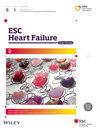Clinical impact of tricuspid regurgitation in patients with acute myocardial infarction
Abstract
Aims
The clinical impact of tricuspid regurgitation (TR) in patients after acute myocardial infarction (AMI) is largely unknown. The aim of this study was to clarify the prevalence and prognostic impact of TR in post-AMI patients treated with appropriate primary percutaneous coronary intervention (PCI).
Methods and results
Three hundred fifty-one consecutive patients with first-onset AMI who underwent successful primary PCI from July 2014 to December 2018 were retrospectively examined. Standard two- and three-dimensional echocardiography were performed at discharge. Based on the presence or absence of mild or greater TR, patients were divided into TR (+) and TR (−) groups, respectively. The primary outcome was the incidence of major adverse cardiac events (MACE), defined as the composite of death, re-hospitalization for congestive heart failure and recurrent MI. Seventy-eight (22.2%) patients had mild or greater TR. Kaplan–Meier analysis showed that the cumulative 6-year incidence of MACE was significantly higher in the TR (+) group (hazard ratio, 2.56 [95% confidence interval, 1.48–4.44]; P < 0.001). In the analysis of the severity of TR, the prognosis of patients with mild TR was significantly worse than that of patients without TR (P = 0.026). Multivariable analysis identified the left anterior descending coronary artery as the culprit vessel, left atrial dilation (>34 mL/m2), reduced left ventricular ejection fraction (<50%) and the presence of significant (≥mild) ischaemic mitral regurgitation as independent predictors of mild or greater residual TR after primary PCI for AMI at discharge. Following adjustment for significant clinical parameters, mild or greater TR at discharge was still associated with a significant hazard ratio for the occurrence of MACE (1.87, [95% confidence interval, 1.01–3.48]; P = 0.048).
Conclusions
The presence of mild or greater TR at discharge may serve as a poor prognostic marker in patients with first-onset AMI. In addition to traditional clinical risk factors, it is important to pay more attention to TR and to manage it appropriately.


 求助内容:
求助内容: 应助结果提醒方式:
应助结果提醒方式:


